
Paradoxes of the peace process
"If some formula for coexistence can be found, it will be the biggest blow to Russian influence"
19 January 2024
The optimistic forecasts of political analysts and experts about the conclusion of a peace treaty between Armenia and Azerbaijan in 2023 have not come true. All hope is for 2024...
In the next program of the "Line of Contact" series within the framework of the joint initiative of Baku and Yerevan Press Clubs, Areg Kochinyan, a political scientist from Armenia, security expert, answered questions about the paradoxes of the current stage of the peace negotiations process.
At the CIS informal summit on December 26 in St. Petersburg, Armenian Prime Minister Nikol Pashinyan and Azerbaijani President Ilham Aliyev talked between sessions. It was the first face-to-face meeting between the two leaders in the last six months. True, the speaker of Russian President Putin said that nothing worthy of special attention happened, it was just "just a few contacts on the feet". However, just a few days later, Armenian Security Council Secretary Armen Grigoryan said that Yerevan had responded to Baku's next peace treaty proposals, and that some issues that had already been agreed upon verbally had not yet been reflected in writing.
What are these issues? Could they have been agreed upon during the mentioned "contacts on the feet" of Aliyev and Pashinyan in St. Petersburg? And what prospects do we have for 2024 in terms of peace talks?
"If you want to solve a problem, there should be a clear outline of it"
As Areg Kochinyan noted, despite the fact that this is the first face-to-face conversation between the leaders in the last 6 months, it is not the only format when representatives of the two countries communicate directly. The expert recalled the joint statement adopted by the Administration of Azerbaijani President Ilham Aliyev and the Office of Armenian Prime Minister Nikol Pashinyan last December.
"When they say that there are verbal agreements that have not yet been transferred to paper, they mean exactly such meetings, not contacts between the leaders of the countries. I don't think that during the meeting in St. Petersburg something concrete was discussed for 2024. There is an expression: if you want to solve a problem, there should be a clear outline of it. The goal is to sign a peace treaty and start the process of normalization of relations between Armenia and Azerbaijan. But there is another formulation of the process: Armenian-Azerbaijani settlement is a much longer and more complicated process than signing a treaty. It will take decades to normalize relations between the Armenian and Azerbaijani peoples," the expert believes.
Nowadays there are often such statements that Armenia is moving away from Russia, while Azerbaijan is on the contrary getting closer to Russia. However, Armenia is a member of the CSTO and the EAEU, while Azerbaijan is not a member of any of these organizations together with Russia, which gives it the opportunity to pursue a more independent policy. Is Armenia really moving away from Russian influence? Do the statements of Armenian politicians correspond to reality, or is the situation here completely different than what is being said?
"If we find a formula for the coexistence of Armenia, Azerbaijan and Turkey..."
According to Areg Kochinyan, the influence of the Russian Federation in Armenia is simply gigantic, it is felt in all spheres of public life, but the assessment of the Russian presence has changed.
"At the root of this comprehensive presence was the thesis that Russia is the guarantor of Armenia's security and will protect Armenians "from the evil Turks". For decades, the Armenian public and political elite agreed to an increased Russian presence in the economy, energy, information field, and infrastructure, believing that we get security and protection for it. Recently, NDI presented the results of a survey conducted in Armenia, and the most interesting thing is that if in 2017 80% of the population considered Russia an ally, now more than half of Armenians do not think so, and about 40% consider Russia a threat. The assessment of the Russian presence in Armenia has changed. Of course, we are not talking about a complete break with Russia or changing relations, we are talking about the only direction - security. For almost a year Armenia has not participated in any CSTO events, moreover, it has withdrawn its permanent representative and has not appointed a new one. We can say that although there is no such procedure in the CSTO, Armenia has "frozen" its membership in this organization. In my opinion, the logical conclusion would be Armenia's withdrawal from this structure. Does the country have the opportunity, resources and will to do it? It does now, and much more than it did at the end of 2022 - beginning of 2023. I think the final argument will be the normalization of relations with Azerbaijan and Turkey. And if it is possible to find some formula for the coexistence of Armenia, Azerbaijan and Turkey, it will be the greatest damage to Russian influence not only in Armenia, but also in the entire South Caucasus," the political scientist believes.
The peace treaty may deprive Russia of very serious leverage in the region. Armenia openly prefers to negotiate on the Western platform. In general, it meets the interests of Azerbaijan. But the Azerbaijani side is convinced that the activities of some Western countries, specifically France, its unilateral diplomatic and military-technical support to Armenia is an attempt by Paris to take the place of Russia, whose influence in the region is diminishing. Azerbaijan proposes to simplify the formula of signing a peace treaty and to do it without mediators. From the point of view of the future of the region and insuring itself against possible risks, this looks attractive. But what prevents Armenia from finally agreeing to this simplified peace formula?
"A peace treaty now without any guarantees from outside looks rather threatening for Armenia"
Areg Kochinyan is somewhat surprised by Baku's position on France: if Azerbaijan has an ally - Turkey, there is no need to complain about Paris' policy.
"On one hand it is true: the more mediators, the more players," says the Armenian political scientist, "the more interests and conflicts thereof and, of course, complexities. But after the defeat in 2020, the Armenian side has some concerns. That is, when signing a treaty without mediators and guarantors, Azerbaijan may start dictating its terms through force or threat of force. A peace treaty now, when there is no parity of forces between Armenia and Azerbaijan without any guarantees from outside, looks quite threatening for Armenia. The second solution to this issue, theoretically, would be to restore some parity of military capabilities between Armenia and Azerbaijan. In this case, I don't even see why Armenia needs such a presence of foreign players and such a deterrent? Moreover, in my opinion, military parity is the only guarantor of lasting peace.
Experience shows that there are practically no ready-made guarantees in the world: guarantees are created, sometimes from scratch, and nothing will happen until the parties themselves learn to provide guarantees to each other. Such guarantees were once given by external forces to Ukraine when it gave up the nuclear weapons it had left at its disposal after the collapse of the Soviet Union. At the time of the crisis, no one even remembered about this document. But here we have another such issue: the opening of communications, which at some point the parties will agree on more specifically. The situation created now around the Zengezur/Mehri road is another paradox of the peace negotiation process. Its economic usefulness, benefit is quite obvious, including in the sense of creating future guarantees for peace. After all, this road will serve not only two states, but it will also have international significance. However, we do not see any concrete steps on the part of Armenia in this direction. Armenia fears that the Russian side wants to control the road which is understandable. But the Azerbaijani leader has repeatedly stated that we are ready to accept the option that Armenia prefers in solving this issue. So why has it turned out to be so complicated and is not being resolved despite the clear benefits it promises?
"If one of the parties wants everything at once, experience shows that it gets nothing"
According to the expert, Armenia has already created a special unit within the security service, which will deal with the security of this and not only this road but also other matters. "Along with this, there was an initiative of the Armenian government, the so-called "Crossroads of Peace". This is basically the realization of the same Mehri road, increased 5 times. That is, these are five roads that connect the east of Armenia with its west, and in principle can connect Azerbaijan with Turkey. In my opinion, this is a more promising package of solutions with further simplification of the management regime of the whole infra-structure than talking about one single road and some exclusive economic preferences. It is impossible to take only this road and demand to pass through it without duties and without control. It does not mean that this cannot be realized, in the future, it is of course possible. Why can Europeans come to such conclusion but we can't? But there is still a long way to go. If one side wants everything at once, practice shows that it gets nothing."
The peace process does indeed raise many questions and reveal paradoxes, most of which are based on mistrust of each other and the sad experience of the past, but there are problems that require not just a thorough discussion at the table, but a immediate solution. Let us hope that the leaders of the two countries and the peoples who were able to stop the long-standing war will have the strength and courage to bring the matter to its logical conclusion and put an end to the enmity.
(The full version of the program can be viewed on Pressklub TV below:)
[embed]












